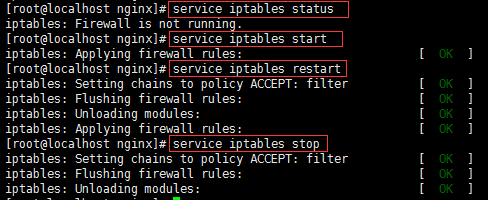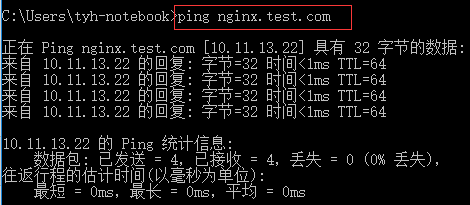Nginx Linux详细安装部署教程
也可参考https://blog.csdn.net/lyzf0413/article/details/82378972
一、Nginx简介
Nginx是一个web服务器也可以用来做负载均衡及反向代理使用,目前使用最多的就是负载均衡,具体简介我就不介绍了百度一下有很多,下面直接进入安装步骤
二、Nginx安装
1、下载Nginx及相关组件
Linux系统是Centos 6.5 64位,我直接切换到root用户下安装
进入用户目录下载程序
下载相关组件
2
3
4
5
6
7
8
9
2省略安装内容...
3[root@localhost src]# wget http://www.openssl.org/source/openssl-fips-2.0.10.tar.gz
4省略安装内容...
5[root@localhost src]# wget http://zlib.net/zlib-1.2.11.tar.gz
6省略安装内容...
7[root@localhost src]# wget ftp://ftp.csx.cam.ac.uk/pub/software/programming/pcre/pcre-8.40.tar.gz
8省略安装内容...
9
安装c++编译环境,如已安装可略过
2
3
4
5
6
2省略安装内容...
3期间会有确认提示输入y回车
4Is this ok [y/N]:y
5省略安装内容...
6
2、安装Nginx及相关组件
openssl安装
2
3
4
5
6
2省略安装内容...
3[root@localhost src]# cd openssl-fips-2.0.10
4[root@localhost openssl-fips-2.0.10]# ./config && make && make install
5省略安装内容...
6
pcre安装
2
3
4
5
6
2省略安装内容...
3[root@localhost src]# cd pcre-8.40
4[root@localhost pcre-8.40]# ./configure && make && make install
5省略安装内容...
6
zlib安装
2
3
4
5
6
2省略安装内容...
3[root@localhost src]# cd zlib-1.2.11
4[root@localhost zlib-1.2.11]# ./configure && make && make install
5省略安装内容...
6
nginx安装
2
3
4
5
6
2省略安装内容...
3[root@localhost src]# cd nginx-1.10.2
4[root@localhost nginx-1.10.2]# ./configure && make && make install
5省略安装内容...
6
3、启动Nginx
先找一下nginx安装到什么位置上了
进入nginx目录并启动
报错了,error while loading shared libraries: libpcre.so.1: cannot open shared object file: No such file or directory,按照下面方式解决
2
3
4
5
6
22.用ln -s /usr/local/lib/libpcre.so.1 /lib64命令做个软连接就可以了
33.用sbin/nginx启动Nginx
44.用ps -aux | grep nginx查看状态
5
6
2
3
4
5
2[root@localhost nginx]# ln -s /usr/local/lib/libpcre.so.1 /lib64
3[root@localhost nginx]# sbin/nginx
4[root@localhost nginx]# ps -aux | grep nginx
5
进入Linux系统的图形界面,打开浏览器输入localhost会看到下图,说明nginx启动成功
nginx的基本操作
2
3
4
5
6
7
8
9
10
11
2[root@localhost ~]# /usr/local/nginx/sbin/nginx
3停止/重启
4[root@localhost ~]# /usr/local/nginx/sbin/nginx -s stop(quit、reload)
5命令帮助
6[root@localhost ~]# /usr/local/nginx/sbin/nginx -h
7验证配置文件
8[root@localhost ~]# /usr/local/nginx/sbin/nginx -t
9配置文件
10[root@localhost ~]# vim /usr/local/nginx/conf/nginx.conf
11
4、简单配置Nginx
打开nginx配置文件位于nginx目录下的conf文件夹下
简单介绍一下vim的语法
2
3
4
5
6
7
8
2开启编辑:按“i”或者“Insert”键
3退出编辑:“Esc”键
4退出vim:“:q”
5保存vim:“:w”
6保存退出vim:“:wq”
7不保存退出vim:“:q!”
8
"#"代表注释,最重要的是server{}块这部分就代表每一个web站点,详细的配置介绍可以查阅我的另一片配置文章,此处我们先暂时设置三个站点
分别使用不同的端口80、81、82保存退出并且重启nginx
5、开启外网访问
在Linux系统中默认有防火墙Iptables管理者所有的端口,只启用默认远程连接22端口其他都关闭,咱们上面设置的80等等也是关闭的,所以我们需要先把应用的端口开启
方法一直接关闭防火墙,这样性能较好,但安全性较差,如果有前置防火墙可以采取这种方式
2
3
4
5
6
2[root@localhost ~]# service iptables stop
3关闭开机自启动防火墙
4[root@localhost ~]# chkconfig iptables off
5[root@localhost ~]# chkconfig --list|grep ipt
6
下面是防火墙的其他操作命令

方法二将开启的端口加入防火墙白名单中,这种方式较安全但性能也相对较差
2
3
4
5
6
7
2[root@localhost ~]# vim /etc/sysconfig/iptables
3增加下面一行代码
4-A INPUT -p tcp -m state -- state NEW -m tcp --dport 80 -j ACCEPT
5保存退出,重启防火墙
6[root@localhost ~]# service iptables restart
7
Linux配置完毕了,使用另一台电脑而非安装nginx的电脑,我是用的windows系统,配置一下host在“C:\Windows\System32\drivers\etc”下的hosts中配置一下域名重定向
2
2
然后cmd再ping一下这个域名是否正确指向了这个IP上

正确指向后在telnet一下80端口看一下是否可以与端口通信(如果telnet提示没有此命令是没有安装客户端,在启用或禁用windows功能处安装后再操作即可)
得到以下界面及代表通信成功
打开这台Windows系统内的浏览器,输入nginx.test.com会得到以下结果,就说明外网访问成功
如果防火墙你依然启用,只是设置了启用端口,那我们访问81那个端口会发现无法访问,因为我并没有加入白名单
到此Nginx服务器雏形部署完成。
6、Nginx负载均衡配置
Nginx集反向代理和负载均衡于一身,在配置文件中修改配就可以实现
首先我们打开配置文件
2
2
每一个server就是一个虚拟主机,我们有一个当作web服务器来使用
2
3
4
5
6
2server_name xxx.com;代表外网访问的域名
3location / {};代表一个过滤器,/匹配所有请求,我们还可以根据自己的情况定义不同的过滤,比如对静态文件js、css、image制定专属过滤
4root html;代表站点根目录
5index index.html;代表默认主页
6
这样配置完毕我们输入域名就可以访问到该站点了。
负载均衡功能往往在接收到某个请求后分配到后端的多台服务器上,那我们就需要upstream{}块来配合使用
2
3
4
5
6
7
8
9
10
11
2ip_hash;代表使用ip地址方式分配跳转后端服务器,同一ip请求每次都会访问同一台后端服务器
3server;代表后端服务器地址
4
5server{};server模块依然是接收外部请求的部分
6server_name;代表外网访问域名
7location / {};同样代表过滤器,用于制定不同请求的不同操作
8proxy_pass;代表后端服务器组名,此组名必须为后端服务器站点域名
9
10server_name和upstream{}的组名可以不一致,server_name是外网访问接收请求的域名,upstream{}的组名是跳转后端服务器时站点访问的域名
11
配置一下Windows的host将我们要访问的域名aaa.test.com指向Linux
因为硬件有限,我是将Windows中的IIS作为Nginx的后端服务器,所以配置一下IIS的站点域名
打开cmd再ping一下aaa.test.com确实指向Linux系统了,再打开浏览器输入aaa.test.com会显示bbb这个站点就代表负载成功了。
Nginx的负载功能就配置完成了,这只是简单设置了一下,生产环境中还有很多详细的调整,后续再逐渐增加,本人水平有限,如有不对之处还望指导谢谢。
